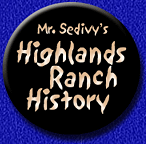
|


|
|
|
Mr. Sedivy's
More Features:
|
Highlands Ranch High School - Mr. Sedivy 
- Advanced Placement European
History - Essay Writing Skills 1. Spelling. I assume that if you are unsure about a word's spelling on take-home essays, you can look it up in the dictionary. Remember - spell check is your friend. 2. Capitalization. Historical eras are capitalized e.g. the Middle Ages, Renaissance, Europe, the Age of Enlightenment. If you have questions about capitalization, look up the word in Palmer, noting if he capitalizes the word or phrase. 3. Always use past tense. The only exception to this is when you are using a person's quote; if his/her quote is in present tense, obviously you accurately record it as stated. But notice how this works: The Austrian Prime Minister Metternich stated, "When France sneezes, Europe catches a cold." 4. Underline books, place artistic and musical works in quotation. 5. Avoid the verb "To Be" e.g. was, were. This verb is passive, bringing the flow of your essay to a halt. One technique in avoiding this problem is to condense your writing when possible. For example, "Shakespeare was a playwright. In his play, Romeo and Juliet, he stated..." Change to this, "Shakespeare, in his play, Romeo and Juliet, stated..." 6. Factual Density. In your essay body paragraphs, pack your writing with facts (e.g. names, dates, places, artistic works, quotes, etc.). To cite a good example, look at Palmer's paragraph on Florence on page 54 of your text. 7. Underline esoteric foreign words (words not frequently used in our language) e.g. sfumato, condotierri, Zurrisenheit, Ubermensch, fin de siecle, etc. 8. Never refer to today, never, never, NEVER. 9. Do NOT use contractions e.g. Don't, wasn't, can't, didn't, etc. 10. Avoid making absolute statements e.g. "The Renaissance totally transformed European culture." "Lenin and the Bolsheviks completely abolished the czarist traditions." Such comments are not accurate, hence find close synonyms, words such as "significantly, decisively, irrevocably," etc. 11. Avoid abstract nouns e.g. mankind, the world, man, humanity. Find more concrete nouns. Instead of constantly writing Renaissance man, be more specific, such as "Renaissance culture, Italian culture, Renaissance painters, artists, sculptors, princes, despots, etc. Let the context of the sentence shape the specific noun to be used. 12. Avoid making evaluation comments e.g. "tremendous, beautiful, wonderful," etc. Do not state, "The Renaissance witnessed the most wonderful achievements in..." Let the reader make up his / her own mind. 13. Avoid poetic phrases e.g. "A bright new dawn burst upon the earth spreading golden rays of sunlight to nurture the gardens of man's greatest ambition..." (I took this quote from an actual student's essay ) Historians are boring people, they pretend they are "Scientific" by writing in a flat, social science style. This is different from what is asked of you in English writing assignments. Always be as clear and concise as you can. Work on condensing your style. 14. Avoid repeating the same word (noun or verb) in close succession, find synonyms. 15. When citing
quotes, use the following rules: 16. Introduction
Paragraphs. Use the following rules: Sample essay introduction: "On October 31, 1517, Martin Luther posted 95 Theses on the door of Wittenberg Cathedral, initiating a religious conflict which ultimately engulfed Europe for 150 years. Possibly Luther's cloistered training blinded him from recognizing the complex economic, social, and political forces at work which would transform and intensify his initial religious dispute into a revolution that irrevocably buried the Medieval world. The late Medieval Church must also take some of the blame, for its increased preoccupation with materialism and worldly power likewise blinded it to the spiritual needs of a troubled era. In response, Protestantism aspired to respiritualize Catholicism by simplifying its structure, doctrine, and practices. Ironically, however, the religious conflicts both sides bred would finally produce a Europe less interested in either faith." 17. Conclusion
Paragraphs. Use the following rules: Sample essay conclusion: "The Peace of Westphalia brought the religious struggle, hence the Reformation to an end. Luther's reforms had been successful in creating an alternative form of Christian practice, and half of Europe followed his cause. But his protest had also bred political chaos, religious fanaticism, and socio-economic upheaval without precedent in early modern history. Exhausted by civil war and international conflict, Europe would increasingly search for a new principal of authority guided by a more secular outlook. Hence, ironically, Luther's program for re-spiritualizing a decadent Medieval Church brought neither ministers or priests into political dominance; instead kings and princes would shape Europe's future destiny, and do so by largely ignoring the faith." (Note how this sample conclusion fits closely with the sample introduction; in a sense bring the essay full circle.) 18. Topic Sentences.
Use the following rules: Sample topic sentences: "The aforementioned economic, social, political, and intellectual forces produced a more secular cultural atmosphere where worldly values could be cultivated and celebrated." "Such wealth demanded new forms of political organization." "For the Italian humanists, however, the rediscovery of Greece and Rome provided the most self-conscious stimulus for the Renaissance." "Even in view of these overwhelming odds, German democracy might have survived." "In contrast to the Enlightenment admiration for classical Greco - Roman culture, Romantic artists found their spiritual homeland in the Medieval past." "Romanticism died on the barricades of revolutionary Europe in 1848." 19. Rhythm.
This is hard to teach/learn, but constantly think of your essay in
terms of flow. That is, it should move along with a quick pace. This
is insured by keeping in mind a couple of strategies: 20. Especially on the first semester take-home essays, devote sufficient time to their writing. Simply to sit down the night before the essay is due and wait for the muses to start talking is not going to get the job done. That's why you have unit syllabi, to give you sufficient time to plan ahead. 21. Above all, keep in mind that writing, like any other skill, only develops over time with concerted, purposeful work. You must desire to improve, and give self-critical analysis to this task. As Ernest Hemmingway once commented, - AP Modern European History in Depth - Lecture Notes and Further Reading Liberating Dachau Related Information Famous
Modern European History Quotes AP Class Activities Helpful Information for Students
Debate Information Additonal Course Info / AP Class Policy
|
Highlands Ranch High School ![]() 9375 South Cresthill Lane
9375 South Cresthill Lane ![]() Highlands Ranch, Colorado 80126
Highlands Ranch, Colorado 80126 ![]() 303-471-7000
303-471-7000
Mr. Sedivy's History Classes
| Colorado History | American
Government | Advanced Placement Modern European
History | Rise of Nation State England | World
History |
| Home | Back to top of page |
Site Contents |
